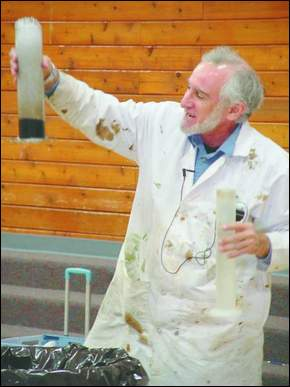 We all know that kids need to learn about science. It is crucial that we train up a new generation of engineers and research scientists who will ensure that this country stay at the forefront in an area that is so important in this new technological world in which we live. But how do we get kids to be interested in science? Obviously, some kids have an innate curiosity about such things but for others... well... take my niece, for example. Start talking about science and her eyes roll back in her head as though I had just suggested we spend an afternoon watching paint dry.
We all know that kids need to learn about science. It is crucial that we train up a new generation of engineers and research scientists who will ensure that this country stay at the forefront in an area that is so important in this new technological world in which we live. But how do we get kids to be interested in science? Obviously, some kids have an innate curiosity about such things but for others... well... take my niece, for example. Start talking about science and her eyes roll back in her head as though I had just suggested we spend an afternoon watching paint dry.For many years, while my own two children were in elementary school here in Michigan, I was the Dad in charge of scheduling school assemblies. I brought in a lot of different programs. The principal at the time was a really wise man named Jim Felix. Jim had been principal at our school in Bloomfield Hills, Michigan for many years. A tall, Gregory Peck kind of fellow, Jim had experience and wisdom to be envied by any young principal. Every year I would meet with him and go over the programs I was suggesting, and listen to him fill me in on anything good he had come across and we would decide which shows to bring in for the school. Jim was always interested in the science programs. He said he believed that part of the reason our school did so well in science scores was that every year we hit the kids with at least one and sometimes two different science assemblies. Good ones. Not glorified “magic” shows, but real science like chemistry, physics, astronomy and so on. And it did, indeed, show up in the science scores every year. The students really liked science and wanted to learn more.

That is the key to science assemblies. It isn’t what facts the kids actually learn in the assembly that is important. What is important is that they see that science is not boring, not dry, not something to be avoided, but rather how exciting it can be to witness chemical reactions, or the effects of Liquid Nitrogen or to ride on a hovercraft. What is important is to give them an enthusiasm for the subject which will allow skilled teachers to then fill their minds through classroom followups. Science assemblies are like can openers for the brain. They open up a young mind so the teachers can then fill it with all the good stuff kids need to learn.
Geoff Beauchamp is the Regional Manager of Mobile Ed Productions where "Education Through Entertainment" has been the guiding principal since 1979. Mobile Ed Productions produces and markets quality educational school assembly programs in the fields of science, history, writing, astronomy, natural science, mathematics, character issues and a variety of other curriculum based areas. In addition, Mr. Beauchamp is a professional actor with 30 years of experience in film, television and on stage. He created and still performs occasionally in Mobile Ed's THE LIVING LINCOLN.







